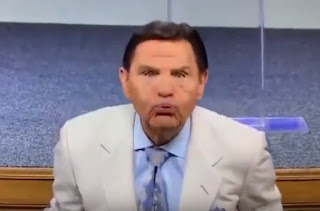If you are like me, perhaps you have been wondering what the Bible has to say about the COVID-19 pandemic. I have been reading and thinking about the response the Biblical prophets or the apostles would have to say to the church in like of these events.
Granted we live in confusing times and we are given confusing messages from Evangelical Christian leaders. From Kenneth Copeland spitting on the COVID-19 (https://www.youtube.com/watch?v=ZMkyDS5ULts) to Pat Robertson claiming that we have cowered before a virus (https://www.youtube.com/watch?v=ZtiUOr-Vw80) to churches trying to ‘liberate’ states from Social Distancing mandates, the church has been confused as to what direction they need to go with this virus.
So what about the Bible? What does the Bible say about this? Surprisingly very little. There is no explicit guidance as to what to do during a pandemic….although many Christians are pointing towards Psalm 91 as proof that God will protect you from the coronavirus (https://www.youtube.com/watch?v=ObpY9DcNhic). In particular Psalm 91:6 seems to be the verse that people key in on: “nor the pestilence that stalks in darkness, nor the destruction that wastes at noonday” (ESV).
But let’s be clear. Psalm 91:6 is not God’s promise to you that you will not get coronavirus. The Psalms are poetry that express general feelings about the Lord, not direct promises from God to you that will neither suffer harm nor have pain inflicted on you. Psalm 91 is not a medal of protection that will keep the virus at bay from you.
Plague, famine, destruction are all things that God’s people have faced throughout history. While there have been instances of individual’s being spared the devastating effects, God has never excluded His people from these plagues. In fact, often it is Christians who are in the front line of these plagues, putting themselves at risk and often succumbing to the effects of them. Jesus is not the ‘vaccine’ for this virus (https://www.christianpost.com/news/jesus-is-my-vaccine-protest-sign-declares-in-pennsylvania-as-people-demand-reopening-of-economy.html).
So if the Bible doesn’t have much to say about pandemics directly…what does it say?
Well, here many American Evangelicals might not like the answer. The main thrust of Biblical ethics are directed toward helping your neighbor and protecting their lives.
We are now seeing Evangelicals protest and demand for their right to open the economy. At the behest of the President, they are seeking to ‘liberate’ the states and ignore social distancing guidelines. We have seen many churches even defy these directives and continue to meet because they see it as an act of faithfulness ( https://www.thedailybeast.com/louisiana-pastor-tony-spell-vows-satan-and-virus-wont-stop-easter-service-as-others-make-unusual-plans). American Evangelicals see the social distancing restrictions placed on the population as a cause to rally against in the name of Jesus…because….Jesus is American?
But this does not do justice to the overarching concern that the Bible has for life and for love of neighbor. A consistent theme is that Christians should be willing and ready to sacrifice…well everything…for others (John 15:13). In the current case, social distancing guidelines could save the lives of people at risk for this disease. Just as we should be cautious about spreading any disease, we should be ready to sacrifice some of our personal liberties to keep others safe. This virus is spread very quickly and has a long incubation period. This means that during one church service has the potential to spread this virus to thousands of people. While I do believe that corporate worship is important, the witness we send to the world about our concern for others is equally valid.
Near where my family lives, there is a large megachurch (with an obnoxious statue of Jesus in the front yard). They have vowed to continue to hold services despite being encouraged and ordered not to. The reaction from neighbors is one of contempt and disgust as these Christians are putting others at risk for disease and possibly further exacerbating the medical system.
But what about the damage done to the economy? Shouldn’t we open up the economy because people will be adversely affected by this? First let’s be clear…yes there will be economic repercussions from this, that is inevitable. But why are Evangelicals thinking of this as an either/or scenario, as if the choice is either we open the economy and sacrifice lives or we keep it closed and hurt people later?
Let’s be clear: the Bible would see this as a both/and situation. Yes we are going to protect people from this virus by sacrificing some of our liberties. And yes we are going to help people in the aftermath of this virus by sacrificing some of our wealth. See what the Bible calls Christians to is to do the best regardless of the situation we find ourselves in. We minister to the best of our ability to all people and try to do the best regardless of how it will impact us.
We do not get the option to sit back and do nothing. We do not get the option of arguing that the economy is worth more than people’s lives. We do not get the option of sitting back and watching others struggle with poverty while we thrive. We are called to love and to work for the life and well being of all. Isn’t that the pro-life position of the Bible (Exodus 20:13, cf. WLC 135-136)?
What does the Bible have to say about coronavirus? Probably not much. But it does say a great deal about acting in love, which is what we are called to do in this time…and everytime.






















